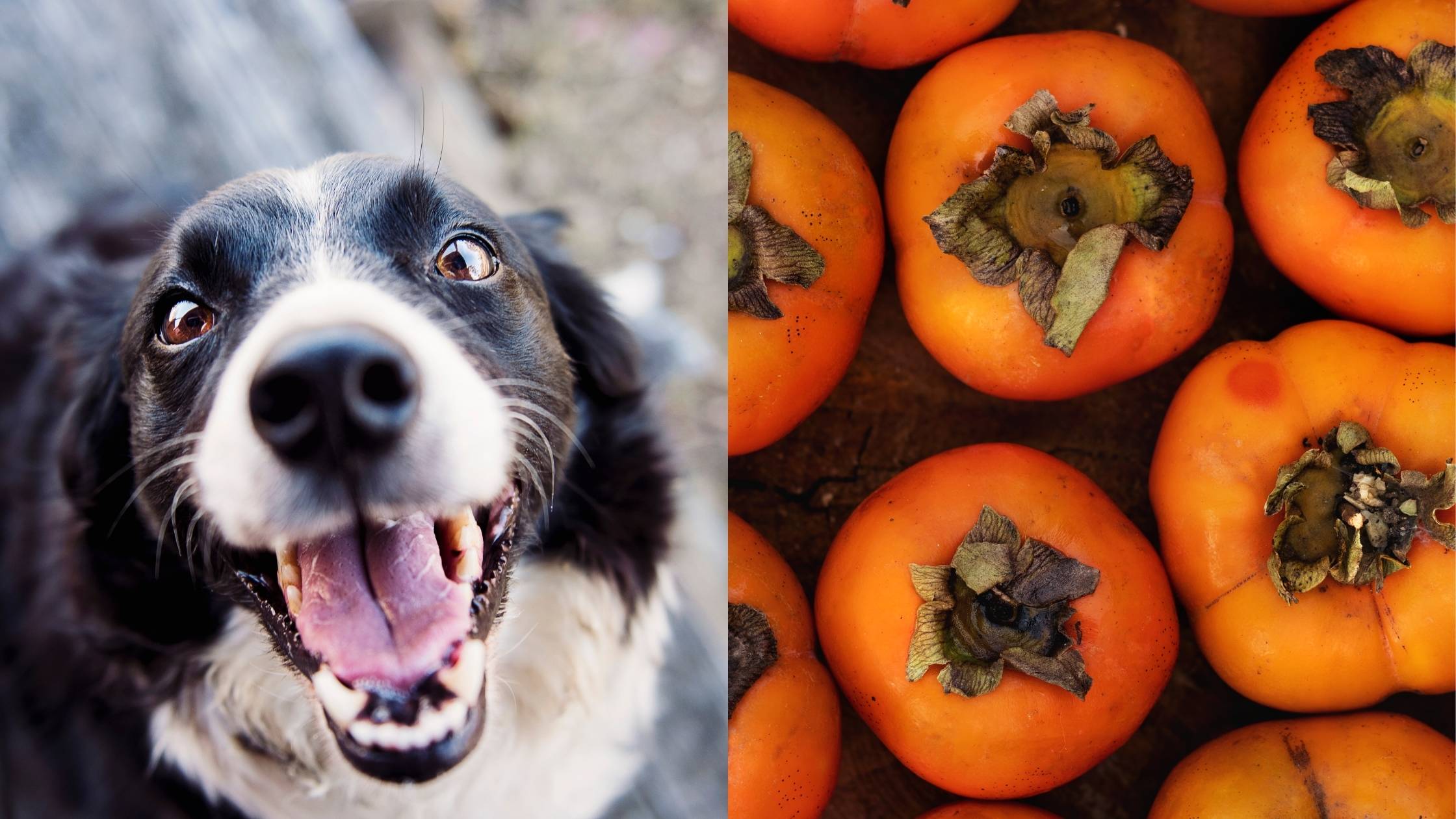Last Updated on 11/18/2021 by Veronica Jones
If you can’t resist the juicy, honey-like taste of persimmon fruit, you may be wondering if you can let your pup experience it too.
But can dogs eat persimmons? Are they dangerous to canines?
This article contains everything you need to know about persimmons and dogs.
What are persimmons?
A persimmon fruit is classed as a berry and is grown on trees in the genus Diospyros. Its sweet and rich taste has been described as similar to honey, while the texture is like an apricot with skin slightly tougher than an apple.
Persimmons are also called Sharon fruit and the sweet variety of this fruit is tomato shaped. If you see a green persimmon it means it’s unripe and shouldn’t be eaten. The skin and flesh will be hard and they will taste astringent. Yellow coloured persimmons are not fully ripe but can still be eaten.
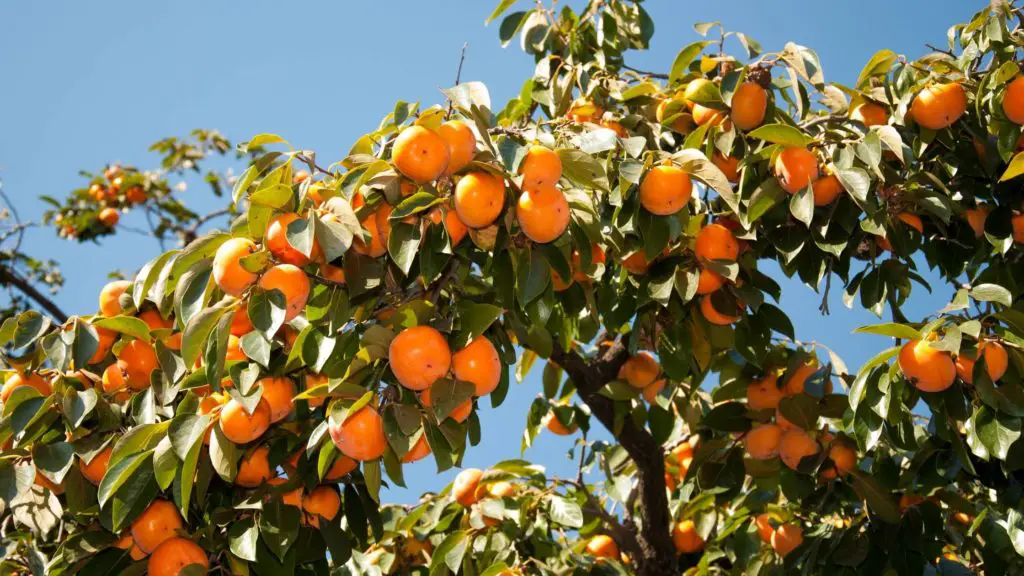
Can dogs eat persimmons?
Yes, dogs can safely eat persimmons as long as the seeds and pit are removed. Whilst there isn’t anything toxic in persimmons, it’s important to watch your dog carefully after trying a new food in case of a reaction.
Are persimmons good for dogs?
Persimmons contain many health benefits for dogs. Let’s look at them in more detail.
Boosts immune systems and promotes overall wellbeing – persimmons are bursting with vitamin C and antioxidants, which help your canine maintain a strong and healthy immune system. Vitamin C also contributes to good overall health and reduces the risk of infections, diabetes and even some types of cancer.
Formation of red blood cells – the folic acid found in persimmons is an essential vitamin for dogs. It is required for the formation of healthy red blood cells. It is especially important for pregnant pups to ensure that the foetus is forming correctly.
Promotes healthy skin and coat – a dog’s skin, coat, muscles and nerves all require vitamin A to function correctly. A lack of vitamin A can cause unhealthy looking skin and coat and muscles will start to deteriorate, leaving your dog feeling weak. Vitamin A is even more important for pregnant females to help the puppy’s growth and development.
Regulates blood sugar – persimmons contain fibre that can help to lower a dog’s cholesterol levels.
Produces energy – manganese in persimmon fruit helps to produce energy and maintain healthy bones and joint cartilage.
Helps to prevent disease and infection – beta-carotene acts as a powerful antioxidant in dogs, fighting common illnesses. Beta-carotene can also be found in carrots, eggs, sweet potato, spinach and broccoli.
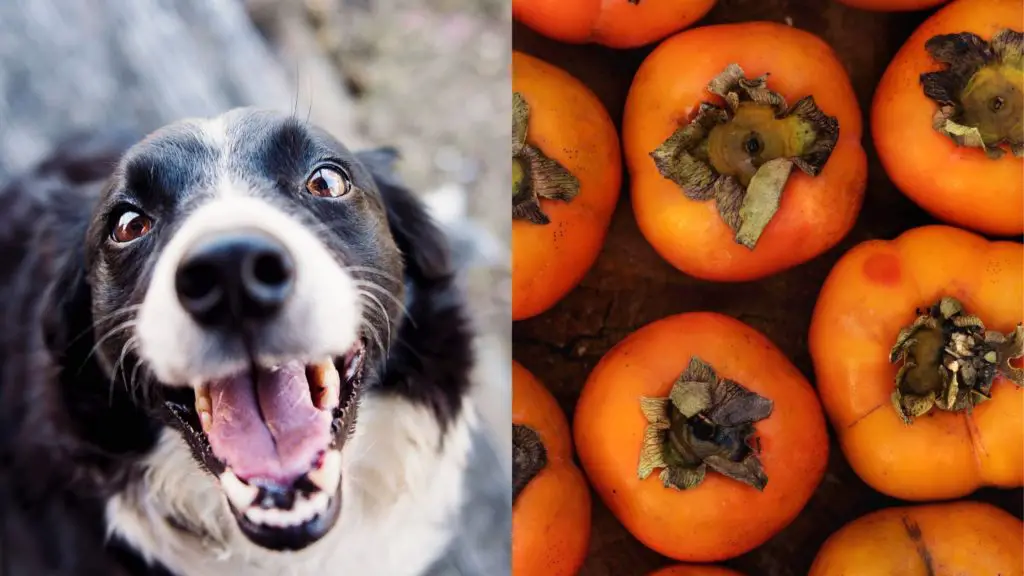
Can persimmons harm canines?
Eating too many persimmons could make your pup vomit and experience diarrhea because of their high fibre content.
Intestinal blockage
Persimmon seeds and persimmon pits could also cause intestinal blockage in a dog’s small intestine, which is why it’s important to prepare the fruit correctly before serving it to your pooch.
Signs that your pup may have a blocked intestine are:
- Vomiting
- Diarrhea
- Straining
- Lethargy
- A lack of appetite
- Burping or drooling
- Abdominal pain
- A bloated or swollen stomach
If your dog swallows a whole persimmon fruit, contact your veterinarian who may suggest a scan or X-ray to check for any blockages. There are various treatment options that your vet may consider depending on the severity of the blockage. A laparotomy may be considered which requires immediate surgery. Your pooch will be given a general anaesthetic so his stomach or intestines can be opened to remove the object. Hospital care and lots of rest will be required to allow your dog to recover from a major operation. Food is typically withheld for a short amount of time after surgery and re-introduced gradually in small amounts.
Choking hazard
The seeds of a persimmon fruit are quite large, which puts your dog at risk of choking on them if eaten. If your dog accidentally eats persimmon seeds and shows signs of choking, you will need to start performing the Heimlich Maneuver. Signs that your pooch may be choking include behaving erratically and coughing, breathing harder or faster than normal, pale or blue gums or gasping for breath. Whilst this is a scary situation for dog owners, it’s important to know what to do as every second counts when your dog is struggling to breathe.

Excessive sugar intake
Like most fruits, persimmons contain large amounts of sugar, which can negatively affect a dog’s health and wellbeing. Cavities, upset stomach, weight gain and diabetes are just some of the health conditions caused by canines eating too much sugar.
Allergies
If you’re concerned that your dog is behaving out of character or showing signs of an allergic reaction after eating persimmons, contact your veterinarian immediately.
Different types of persimmons
Persimmons come in different forms, so it’s important to know which ones are canine-friendly and which ones should be avoided.
Can dogs eat fresh persimmons?
Fresh persimmons are safe for canines to eat in moderation. You should only give them small amounts as an occasional treat because the high sugar and fibre content could cause problems such as diabetes and gastrointestinal upset if consumed regularly.
Can dogs eat Fuyu persimmons?
Fuyu persimmons are the most common type of persimmon and taste similar to pears. Dogs can eat them safely in moderation.
Can dogs eat dried persimmons?
Dried fruits often contain even more sugar than fresh fruit. If feeding dried persimmons to your pup, be mindful of the high sugar and make sure they are cut small enough to avoid your dog getting them stuck in his throat.
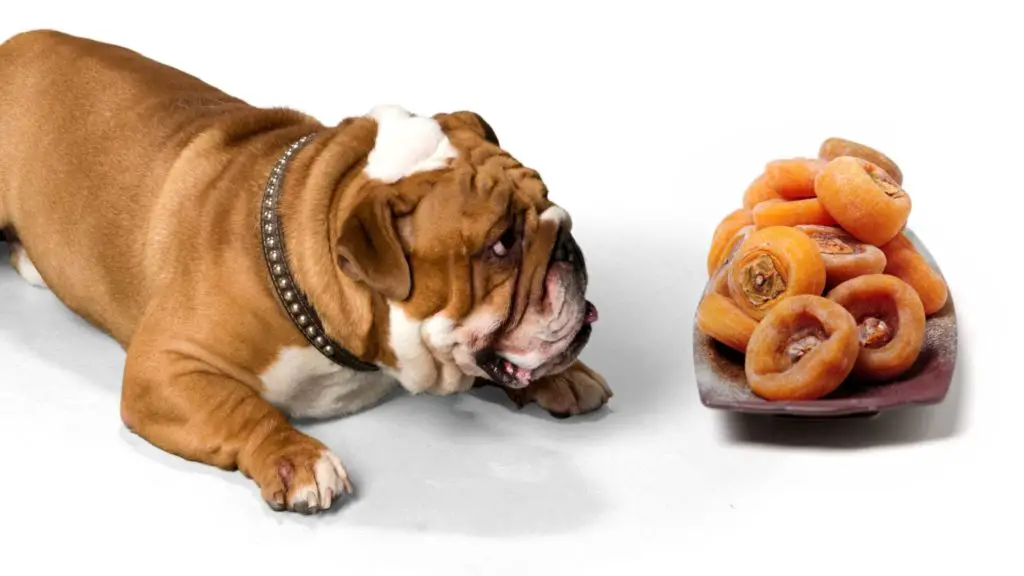
Can dogs eat cooked persimmons?
Your pup can eat cooked persimmon as long as they have not been cooked in spices that are toxic to dogs.
Nutmeg is a popular spice that contains a compound called Myristicin which is toxic to pets. Although it’s not a spice, cocoa powder is often used when cooking fruit. Like chocolate, cocoa powder can cause serious harm to dogs because it contains a compound similar to caffeine, which can cause damage to a dog’s nervous system.
Consuming cocoa powder can contribute to kidney trouble and heart problems in dogs and should never be given to your pet.
Can dogs eat persimmon skin?
The skin of a persimmon is safe to eat and won’t cause your pup any harm. Just remember to remove the seeds and pits before serving to your furry friend.
Can dogs eat persimmon leaves?
It’s not recommended that canines eat persimmon leaves as they could be hard for a dog’s digestive system to break down.
How to feed your dog persimmons
You may be wondering if you should remove the skin of a persimmon before serving to your pup or if you should cut it up. Here’s how to safely let your pet enjoy this juicy and tasty fruit.
As with all new foods, introduce persimmons in small amounts and gradually. Follow these simple steps to safely let your pet try persimmon fruit.
1. Wash the fruit thoroughly.
2. Cut it into small, bite-sized pieces.
3. Remove the seeds and pit.
If you think your dog may struggle to chew the fruit, you can mash it up to make it easier to digest. Mashed persimmon fruit can be served as an occasional snack or on top of your dog’s usual food. If you’re wondering how many persimmons can dogs eat, contact your vet for advice.
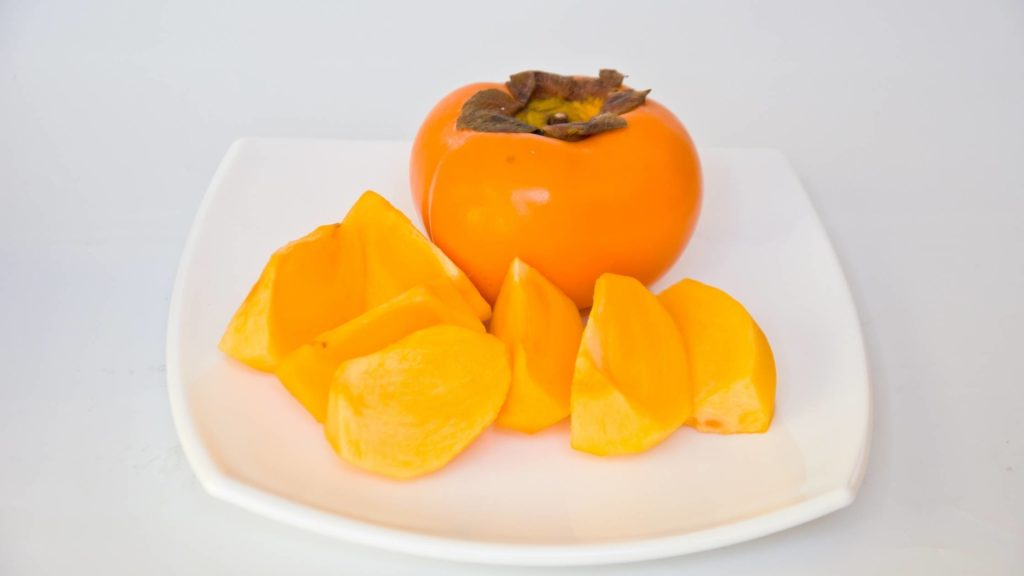
Other dangerous fruits to avoid
Avocado – the pit of an avocado contains a toxin called persin that can cause vomiting and diarrhea in canines and should not be given to them to eat.
Cherries – cyanide is found in cherries which is highly toxic and shouldn’t be included in your dog’s diet. Cyanide prevents effective oxygen transportation around the body, which means your dog’s blood cells are unable to get enough oxygen. Symptoms of cyanide poisoning in dogs include difficulty breathing, dilated pupils and red gums. Even a small amount of cyanide can cause fatalities and cyanide poisoning should be treated as a medical emergency. The seeds of a cherry can also cause an obstruction in the gastrointestinal tract.
Grapes – never feed grapes or raisins to your dog because they contain a toxic chemical that can cause sudden kidney failure in canines.
Grapefruit – the rind of grapefruit is toxic to dogs and the flesh is extremely acidic, which can cause digestive issues.
Lemon – some citrus fruits such as lemons can cause digestive problems. The high levels of citric acid in lemons could also make your pup sick.
Lime – just like lemons, limes contain dangerous levels of citric acid and should not be consumed by dogs.
Plums – the pit of a plum has been known to cause bowel blockages in dogs.
Rhubarb – the toxins found in rhubarb can cause damage to your dog’s nervous system, kidneys and digestive system.
Tomatoes – whilst dogs can safely eat ripe tomatoes, unripe tomatoes should be avoided because they contain solanine and tomatine that are highly toxic to some animals, including canines.
Apples, bananas, blueberries, blackberries, cranberries, mango, pear, pineapple, raspberries, strawberries and oranges are all considered doggy-safe fruits if prepared correctly and given in moderation. All fruits should be cut up into small pieces to prevent choking in canines.
Dogs and persimmons
So, can my dog eat persimmons? Persimmons are generally safe for doggy consumption if prepared correctly and given in moderation. However, they can cause health issues for your pet if you don’t remove traces of the seeds and pit. If your four-legged friend shows any concerning signs after eating persimmon fruit, contact your veterinarian immediately for advice.
Looking for More Great Articles About What Your Dog Can (or Can’t) Eat?
- Can Dogs Eat Acai (Berries or Bowls)? Is it Safe?
- Can Dogs Eat Dragon Fruit? Everything You Need to Know
- Can Dogs Eat Mulberries? Are they Safe for Dogs?
- Can Dogs Eat Pomelo Fruit?
Reference list
- VCA Hospitals “antioxidants in dogs” https://vcahospitals.com/know-your-pet/antioxidants Accessed 15th November 2021
- PDSA “safe fruits for dogs” https://www.pdsa.org.uk/pet-help-and-advice/looking-after-your-pet/puppies-dogs/safe-fruit-and-veg-for-dogs Accessed 15th November 2021
- PET MD “dangers of stone fruits for dogs” https://www.petmd.com/dog/general-health/6-dangers-stone-fruits-dogs Accessed 15th November 2021

